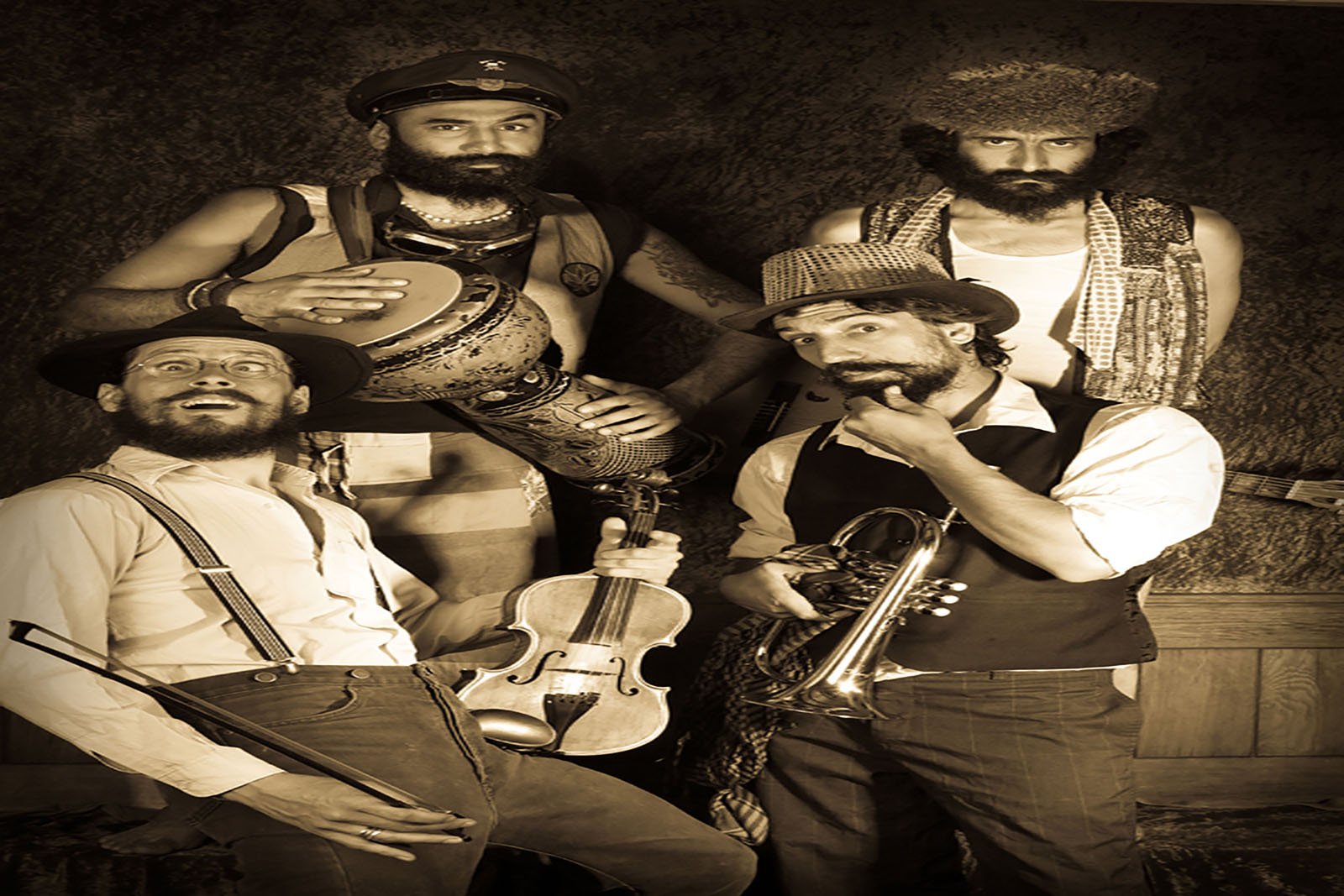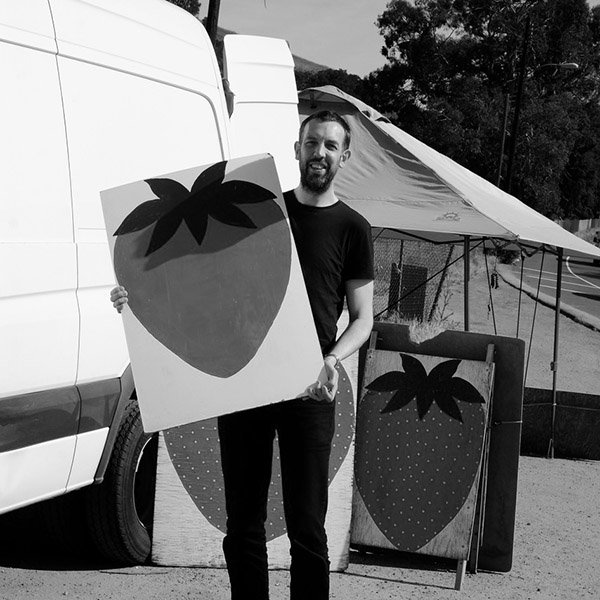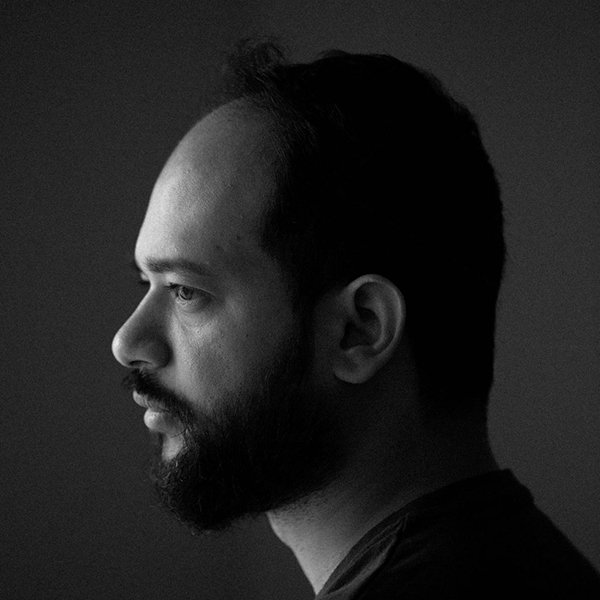The Turbans is an international musical collective travelling the world on a quest to discover and create great music, starting in Nepal in 2009 when classical violinist Darius Luke Thompson and guitarist Oshan Mahony played together for the first time in Kathmandu. They travelled by bicycle to India where they formed a band that has played music all the way through Pakistan, India, Turkey, Greece, Poland, Spain and the UK for the last three years. Emaho caught up with founding members Darius and Oshan to see what makes The Turbans tick.

EMAHO: Why are you guys called ‘The Turbans’?
Darius: I came up with the name a few days before our first concert in Bhagsu in India. It just came to me because of where we were and it seemed a kind of cool abstract and pithy name that conveyed something eastern and plural (to represent a group), we were playing Middle-Eastern and Celtic tunes then; it seemed to fit and now it has definitely stuck!
Oshan: Darius and I had just cycled across to Dharamshala from Kathmandu and instead of wearing a helmet on the bike I wore a big purple dhoti as a Turban. I think he got the idea from this!

EMAHO: How did you guys get together in Kathmandu?
Darius: I used to be in an opera orchestra but I got bored and went to Chinato cycle to the UK. I was dusting off my touring cycle, with no interest whatsoever in making music, to make my way over land to the UK through my ancestral country Iran, from Kathmandu, and I met Oshan walking down the street. We got chatting and hung out in the Durbar Square. Oshan was playing guitar and he suggested we busk. We made 125 Nepali Rupees. After that we made our way to India by bicycle. It wasn’t until after we were friends for four months that we played a concert with Chinua Ford and Itay Nevo that we found ourselves at the start of this amazing journey. Chinua brought some great Celtic/Bluegrass repertoire and Itay some beautiful ancient Middle-Eastern songs. We had a set and people danced like they were possessed. I was surprised. It felt a lot more fun than orchestra and I was hooked.
Oshan: I had just played a few open mics before and I felt like I was a great musician (if only I knew how little I knew). When I met Darius he told me he was a violinist and I thought we should try jamming. We didn’t gel so well at first but rather had to wait for the bonding of cycling and travelling and meeting with the right other people. Those people were Itay and Chinua and together we just played some folk music and it drove people wild.
EMAHO: Your choice of genre is radically and unconventionally folksy. A blend of Gypsy/ Klezmer/ Turkish/ Balkan/ Celtic/ Greek. How and why did you guys decide upon this style?
Oshan: I feel that these musical styles really capture soul and high energy. The people where these styles come from have often been oppressed and moved about a lot. It really comes out in their music. I had travelled through some of these countries before the band and was really inspired by what I heard. Our band has and will continue to be a travelling band with people from all over the world without deep roots in one place. These musical styles reflect that.

EMAHO: Darius left behind his orchestra to learn folk, Oshan came to travel India and found himself in a band, Maxim was a successful electric guitarist and left that behind to join the band, Cabbar met Oshan and Darius on the street. Does this idiosyncratic impulse and spontaneity of its members extend to the music of the band too? Walk us through the process of completion of an average song, from the conception to the finished song.
Darius: OK, to my mind the individuals and the repertoire are inextricably linked, because we mostly met while travelling and the collection of repertoire has been an organic process whereby I or someone else hears a song or knows one, and teaches it to whoever is playing at that time. Obviously while Oshan and I were travelling non-stop for two and a half years we heard a lot of music from here and there, and I recorded a few themes on my recorder, coming back to them and learning melodies, Oshan would prepare a rhythm guitar part then we were good to go. Or we busked with friends who taught us something and we then made our own version, and then over time shared it with the band in its different incarnations. Some of our songs we have played since the very beginning and they have been reinterpreted and rearranged by different people at different times, grown stale and then rejuvenated through arrangement with new stuff. It is super-organic and when someone comes to the band and brings a song or arrangement that contains their personal or musical character, it can also be very strange if they move on. Sometimes you can see how music and people are really one thing when you see a piece of music start to sound rubbish because the heart and soul of the vibe is gone. It can happen, but mostly our repertoire is constantly changing and evolving – organic evolution. We didn’t really write, it’s mostly folk stuff, but it’s very exciting to anticipate creating some original music. We have some amazing talent in the band, and it looks like next year it will evolve in that direction.
Oshan: Our music is always changing. This can be difficult because as soon as we reach a point of really getting a good set together someone will be incorporated to the group and we will have to teach the songs over again and in doing so the structure will change and new things will be added or taken away. This is a blessing and a curse. It’s unique with every line-up but doesn’t allow us to reach our full musical potential. An average song will come to the group with a melody.
We then will play it through together figuring out rhythm, chords, harmonies, breaks, stops, and a nice intro and outro. This process generally involves a lot of arguing but results in a well rounded piece of music.

EMAHO: Are you satisfied with the reception of your music? Has it been difficult to find your niche?
Darius: I think we are pretty happy, we got a great reception in London, at least. But London is small too and so we need to reach a wider audience, but that will happen in time, I believe. We just recorded some demo tracks for the first time, so it is a first step towards assessing what we can do. We play a lot of parties and festivals and people dance and go crazy, but we could make music in all sorts of different ways, making different kinds of concerts, acoustic, progressive and interactive stuff, or get into education too. I want to play to 5,000 people one day, that will be fun.
Oshan: We often busk on the street and when doing so we play to every possible type of person from all levels of society. The reception we get is great and people that would never normally listen to this style of music do and are really excited to hear something that they would never have come across listening to the pop charts. Who knows but today’s folk music can be tomorrow’s pop.
EMAHO: The Turbans has always been a mélange of ethnicities. Is that a coincidence or was it one of the goals of the band?
Darius: It was total coincidence, but inside the process is the fact that like-minds stick together. And it is nice that your job is basically hanging out with your friends.
Oshan: For me it has always been important to connect with people from all over the world. It’s what really makes me happy. It is part coincidence as we never plan on getting someone from a certain country to join the group but at the same time our music is world folk so when we meet someone from an interesting culture we naturally want to share music with them. This often ends with them playing with us.

EMAHO:What has the ride been like? Which has been your most memorable musical tour?
Darius: The music was in part conceived out of the experience of travelling, it is hard to separate and prefer one or the other for me, but there are certain limitations in leading a life on the road, you cannot work in one place on composition or recording, for example. Or build up work or plan projects, but travelling is a different kettle of fish, it is alive and the experiences come thick and fast. I want to make good music for people, it is the number one priority. But I am also following a sort of path, even as I went from England to Tibet and cycled to India. I want to bring that path to a close and so I am going back to bring my cycle through Pakistan and Iran this winter. Then it is back to music for me. My most memorable tour was busking three months in Istanbul and parts of Greece with Oshan. We were hammering it every day to make money to survive and it was incredible. We travelled to Greece and met Steele the drummer (who we played with in Goa) and we worked in the heat playing outside restaurants and busking, and then we went and lived in nature on an island for a month or so. It was extraordinary. Without keeping on with the music through those six months I doubt the band would exist.
Oshan: I love travelling and playing. I have never done one without the other. My first travel round Europe is when I first touched a guitar and almost immediately I was using music as a mean to travel and meet people. My most memorable tour was in Chania, Greece. We worked hard and played hard. We were three and sometimes four people playing on the street, in restaurants, an abandoned mosque, a squat on a boat. It was crazy!!!

EMAHO: Both Turkey and London are known to have a crazy underground music scene. How has the experiences of living and playing there been?
Darius: Turkey(or let’s say Istanbul) is a vibrant booming city with a lot of music going on. But the first bars and nightclubs only opened in the ’80s and ’90s and I think it’s in a process of development even now, so you can’t compare the music scene to London. London is the queen of cosmopolitanism and it is a centre for world music. The same can’t be said of Istanbul, which is still a centre of Turkish music unrivaled by London. I love staying in Istanbul, it’s like going back in time and it gives my violin playing a nice flavour that I want to pursue. I love Turkish maqam and the style of playing, but it is difficult so I have a lot of study to do. But the food is great, so that’s fine. As a Londoner, born and bred who went away in 2003, I feel very happy to come back and play to people, it is a dream come true!
Oshan: Both cities have so much to teach.London has the style, energy and uniqueness.Istanbul is authentic and alive. Living in both cities can be hard for me as I grew up in the country side but in reality I think I was just saving up myself to dive right in to the nightlife and culture.

EMAHO: What do you think about the state of folk music in the world today? Do you think it’s a dying art?
Darius: Definitely not, people are realising that there’s great music anywhere, in the next pub or around the corner and in a sense here in London, because of all the mixed culture, it is starting to feel more like Turkey or Greece or Ireland, where people play music and jam all the time. The Internet is helping people get to hear random and unknown musicians playing. It is growing. But the original and authentic sources of folk music, I can’t say. I am sure a lot of that is under threat somehow. It is all well and good a classical musician like me playing a tune from Romania, but there are specific and special styles and masters. We should try to preserve those things. But music will go on whatever happens.
Oshan: Folk music comes in many form, these come and go. I believe we are now in a revival or maybe a discovery period where music from all over the world and from past ages can be found through the click of a button.

EMAHO: What’s keeping the band busy these days?
Darius: Well, we finished playing hard in the UK the last five months to have a bit of a break; I need to go visit some family in Iran; but we start with a big comeback concert in London in the spring and then summer should be very interesting. We may tour Greece, and play in Spain or other parts of Europe. We want to record more and write more. I’m sure we will let you guys know so you can share the experience!
Oshan: We have all gone our separate ways after a long year. I am writing from Hampi at the moment going on tour with a Royal Enfield. I think this summer we will be touring round European festival and maybe releasing an EP and who knows, maybe an album. Autumn in Himachal?
Art & Culture Interviewed by Suchi Kedia











